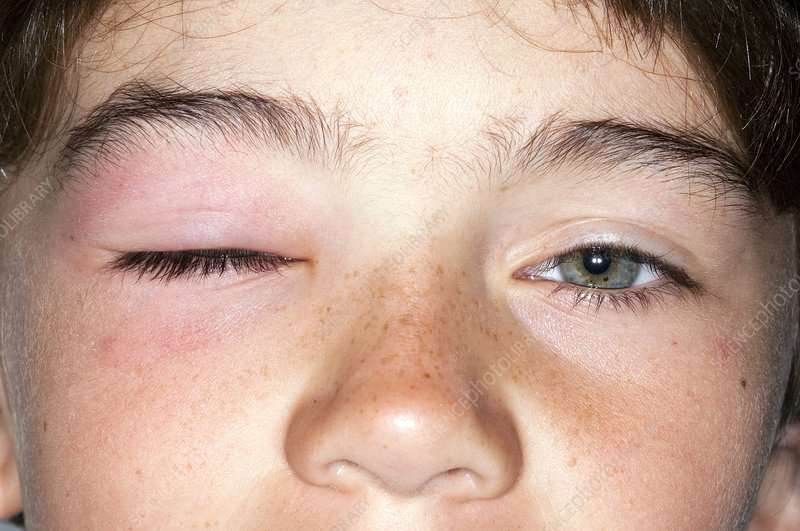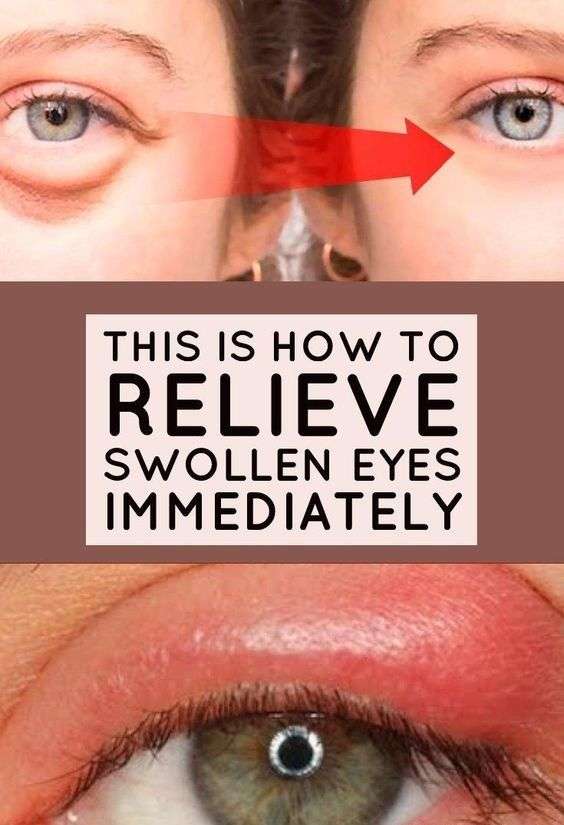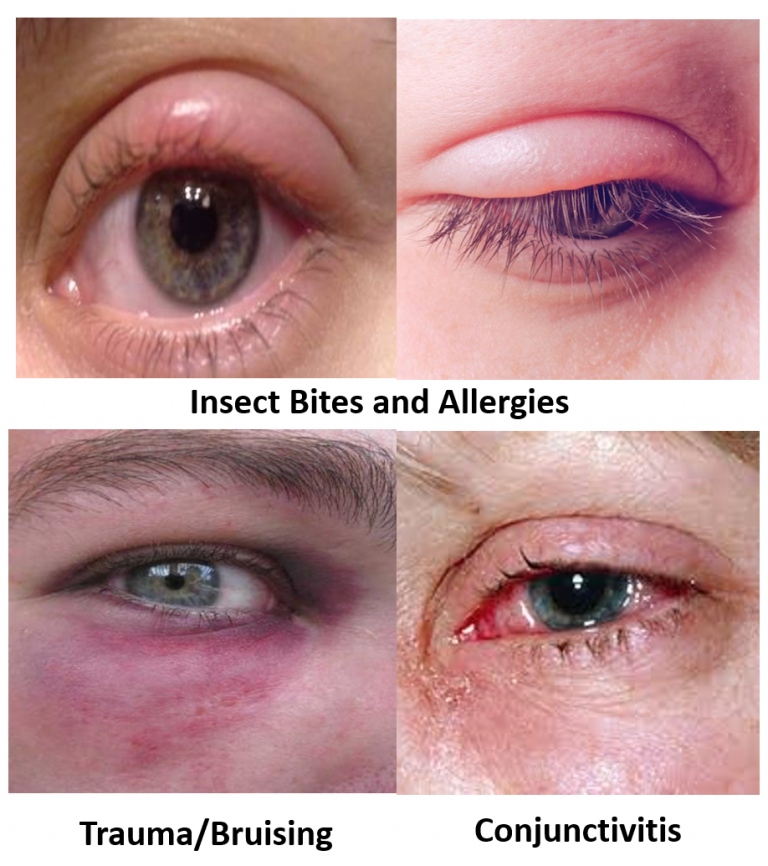Causes Of Eye Swelling On Both Sides
- Allergic Conjunctivitis. Itchy pink eyes from pollen or pet dander.
- Viral Conjunctivitis. The main symptom is red eyes with a cold.
- Bacterial Conjunctivitis. The main symptom is yellow pus in the eye or eyes. Eyelids may be matted shut.
- Edema . Edema is retained fluid within body tissues. Edema fluid first appears as swelling of the feet due to gravity. Edema fluid also occurs around both eyes after lying down. It’s caused by kidney, heart or liver failure.
- Anaphylaxis . A severe life-threatening allergic reaction. Triggered by foods, drugs and bee stings. Serious symptoms such as trouble breathing or swallowing occur. Hives are almost always present.
When Do Swollen Eyes From An Allergic Reaction Occur
Swollen eyes from an allergic reaction happen when the bodys immune system reacts to an allergen. It can be something you eat, inject into your body, touch, or inhale into your lungs. People can develop symptoms such as sneezing, coughing, a runny nose, a scratchy throat, a skin rash, and swollen eyes. An allergic reaction may cause a life-threatening condition called anaphylaxis. This causes hives, difficulty in breathing, low blood pressure, asthma attacks, and even death.
Strategies To Relieve Swollen Puffy Eyes
The best way to avoid the tender, puffy eyes and utter misery of allergic reactions is to treat the underlying cause. If using over-the-counter antihistamines doesnt help, see your doctor for a prescription allergy medication or other treatments. If its too late for prevention, and you already look like youve cried for three days, there are several ways you can ease the symptoms.
- If possible, immediately remove yourself from the source of the allergic reaction, and rinse or cleanse your face.
- Use an eye wash product to rinse allergens away from the surface ofyour eyeballs and eyelids.
- Apply a cold compress or ice pack to reduce inflammation.
- Use an over-the-counter or prescription eye drop designed to treat eye allergies.
- If the initial allergy symptoms have passed but swelling still persists, apply a skin care product designed to reduce the appearance of eye puffiness.
Don’t Miss: Fexofenadine Vs Allegra
Preservative Free Eye Drops
Preservative-free drops are recommended because they contain fewer additives which can further irritate the eyes. Keep in mind that many of these preservative-free eye drops may only be used for a few weeks after the bottle is opened it is important to follow the directions on the bottle.
In addition, many eye drops come in two forms, single-use preservative free vials and multi-use bottles, with or without preservatives. There are advantages and disadvantages to both. Ask your eye doctor what he recommends for your individual needs.
When To See A Healthcare Provider

Sometimes, puffiness can be the result of an underlying condition, such as thyroid disease. If youre not sure why youre suffering from puffy eyes, its best to talk to a healthcare provider.
Some conditions that may cause under-eye swelling and puffiness include:
- Cancer
- Cellulitis around the eye
Most eye swelling that’s associated with a medical condition goes away on its own after the condition is treated. But puffiness that doesnt go away can be a sign of worsening problems or complications. You should make an appointment to see your healthcare provider right away if at-home treatments dont work, or if the swelling around your eyes is getting worse.
And if you have eye swelling as the result of a traumatic injury, seek medical attention right away. Not sure if your symptoms are serious?
Here are some signs its time to see a healthcare provider:
- You have pain in or around your eyes
- Youre having vision troubles
- It feels like theres something in your eye
Recommended Reading: Eatz Toffee Peanuts
Have An Allergy Plan And Stick To It
The best way to avoid suffering from itchy, swollen eyes, watery eyes, and other allergy symptoms is to prevent symptoms before they start. Know your allergy triggers and do your best to avoid them. Do you feel better or worse during certain times of the year? Your doctor can perform allergy testing to identify which substances are irritants for you. You may need a combination of oral medications, nasal sprays, eye drops, and shots to control your eye allergy and allergic symptoms. Ask your doctor how best to control your chronic allergy symptoms and what to do if you have an allergic reaction.
Self-Care Tips
Ask whether home remedies, like applying a cool compress over itchy eyes, will help. Discuss plans for how to treat mild and more severe symptoms with the doctor. Ditch the contact lenses when itchy eyes flare up. Stick to glasses. Follow your doctor’s eye care instructions. Stash moisturizing eyedrops on hand at home and work to treat dry eyes when they occur. Protect your eye health by wearing sunglasses outside. You can manage diseases like eye allergies, asthma, eczema, and other conditions with the right plan.
What Is The Treatment For Eye Allergies
The first and best option is to avoid contact with substances that trigger your eye allergies. If that is not enough, consider using:
- Saline eye drops to wash away the allergens
- Over-the-counter medicine or eye drops
- Prescription treatments from your doctor
- Allergy shots from your doctor
Eye allergy symptoms may disappear completely when the allergen is removed or after the allergy is treated. Talk to your pharmacist and health care provider about what is best for you.
Recommended Reading: Twix Ingredients Allergy
Tips To Ease Swollen Eyes
Remember, these are your eyes were talking about, so check with your doctor or ophthalmologist before you try any treatment. But if you’re looking for relief, consider the following home remedies and medical interventions.
Wash your face. Washing your face is one of the first things you should do to combat itchy, swollen eyes, says Ogbogu. It can help wash away the allergens sticking to your skin and eyelashes.
Rinse out the eyes. “Rinse out the eyes if you can with a little bit of water, and that’s usually helpful,” Ogbogu says. That will loosen the allergens from the inside of your eyes and help to flush them out.
Apply a cold compress. “Cold compresses around the eyes can be helpful with itching and swelling,” says Ogbogu. Soak a towel or washcloth in cold water or refrigerate a damp cloth or eye pillow. Then lie down with the compress across your eyes to let the coolness reduce swollen eyelids.
Try allergy eye drops. Ogbogu suggests trying an over-the-counter eye drop made to soothe itchy, swollen eyes caused by allergies. An ophthalmologist might prescribe an antihistamine eye drop. The AAO cautions that using these drops for more than three days may actually increase irritating symptoms.
Mast cell stabilizer eye drops can also be effective, preventing the release of histamines in your body. Unlike antihistamines, these need to be administered before exposure to an allergen in order to prevent itching, notes the American College of Allergy, Asthma & Immunology.
Causes Of Eye Swelling On One Side
- Rubbing the Eye. Rubbing from any cause will make the eyelids puffy. Often, it starts from getting an irritant in the eye. Young children often touch their eyes with dirty hands. They also may get food in the eye.
- Insect Bite near the eye. A reaction to the insect’s spit causes swelling. The loose eye tissues swell easily. The most common bite is from a mosquito.
- Contact Dermatitis near the eye. An example is poison ivy.
- Injury near the eye. Can cause a bruise and swelling.
- Sty. A minor infection of an eyelash.
- Dacryocystitis. An infection of the tear sac in the corner of the eye.
- Ethmoid Sinus Infection . This causes swelling and redness of the eyelid. The ethmoid sinus is behind the eye.
- Periorbital Cellulitis . A bacterial infection of the eyelid. Caused by spread from nearby infected wound or insect bite. The eyelid is very red and usually painful to touch.
Read Also: Non Drowsy Over The Counter Allergy Medicine
How To Prevent Eye Allergy Symptoms
Avoid allergy triggers by implementing the following suggestions:
- Use air conditioning. Keep windows closed during high pollen seasons.
- Wear glasses orsunglasses. This will help to protect your eyes from pollen.
- Limit dust accumulation. Use mite-proof bedding covers and wash your bedding frequently, using hot water . Clean shelves with a wet rag and floors with a mop, instead of dry-dusting or sweeping.
- Control mold. Use a dehumidifier to control mold growth. Treat visible mold with detergent and a five percent bleach solution.
- Wash your hands. This will help to eliminate any allergens you may have come in contact with, such as when touching a pet or cutting the grass.
- Avoid rubbing your eyes. This can further irritate your eyes.
- Choose your makeup carefully. Certain makeup products can irritate your eyes and exacerbate eye allergy symptoms. Look for makeup products that contain natural ingredients and are designed for sensitive eyes and skin.
How Can I Prevent My Eyes From Becoming Puffy
There are several things you can do to prevent your eyes from becoming puffy. Tips to avoid puffy eyes include:
- Avoiding rubbing your eyes apply cold compresses when itching occurs
- Avoid irritants such as smoke
- Avoid allergens when possible
- Drink plenty of water to avoid water retention and to keep your body cleansed
- Do not use cucumbers, tea bags, or other foods to reduce puffy eyes foods contain bacteria that may cause an infection
- Increase your vitamin intake
- Avoid excessive amounts of alcohol, especially before bed
- Avoid or limit sodium when possible
- Talk with your eye doctor about avoiding puffy eyes altogether
As mentioned above, vitamins can play a major role in your eyes overall health. Healthy eyes are usually resistant to such problems, and vitamins can help improve the condition of the skin, muscles, nerves, and blood vessels in and around the eyes.
Use this chart to monitor your daily vitamin intake. Talk with your eye care professional or health care provider before increasing or decreasing your daily dosage of vitamins.
| Vitamin |
Don’t Miss: Peanut Allergy Kit Kat
Allergy Medications For Eyes
Over-the-counter and prescription medications can give short-term relief of some eye allergy symptoms. Prescription treatments can provide both short- and long-term help.
Sterile saline rinses and eye lubricants can soothe irritated eyes and help flush out allergens.
eye drops can curb eye redness by constricting blood vessels in the eyes. These drops tend to sting a bit, and they donât relieve all symptoms. Whatâs more, their effect tends to be short-lived. If you use them for more than a few days, it can cause ”rebound” eye redness.
eye drops containing ketotifen can ease allergy symptoms for up to 12 hours. They wonât cause rebound redness even with long-term use.
Refrigerating your eye drops may bring more relief.
In addition to red, itchy eyes from allergies, many people also have other symptoms, like a stuffy, runny nose. If you do, nasal steroid sprays can help your eyes and nose. Over-the-counter options include Flonase, Rhinocort, and Nasacort. Several others are also available with a doctor’s prescription.
Oral antihistamines can also help. Cetirizine and loratadine tend to be less sedating than some older drugs, and they provide longer-lasting relief. Keep in mind, though, that oral antihistamines do dry the eyes and can make a dry eye condition worse.
If you need more help, a doctor can prescribe other eye drops. For severe or persistent cases, immunotherapy can also help.
Show Sources
Fluid Retention Due To Other Medical Conditions

Fluid can gather throughout the body if you are retaining fluid – a condition called oedema. Whilst fluid retention is often noticeable in the fingers, around the lips and lower face, around the feet and ankles, and in the lower part of the back, you may notice it first in your eyelids because of the effect this has on your facial appearance.
You May Like: Are Twix Nut Free
Other Causes Of Eyelid Swelling
Eyelid swelling can be due to a variety of infections and other conditions, including:
- cavernous sinus , which refers to a in the cavity at the base of the brain
- eye cancer
- organ failure, such as heart, liver, or
- , or herpes zoster ophthalmicus
- sinus infection or sinusitis
Because a swollen eyelid can be a symptom of a serious underlying condition, speak with your doctor if your eyelid swelling persists or if you experience additional symptoms.
What Causes Left Eye Swelling
Allergic causes of eye swelling. Allergic reactions are a common cause of eye swelling.
What helps a swollen eye?
Use a saline solution to rinse your eyes,if theres discharge.
Don’t Miss: Zyrtec An Antihistamine
What Is The Prognosis Of Eye Allergies
The prognosis is favorable for most patients with eye allergies. Typically symptoms clear up quickly with OTC/home treatment or when the offending allergen is not present any more. Unfortunately the symptoms may reoccur depending on the cause of the eye allergy. Health complications are very rare, but medical attentions should be sought immediately for any pain or vision loss that occurs or for symptoms that do not resolve within 12 hours.
What Are Eye Allergy Symptoms And Signs
Typical symptoms associated with eye allergies include inflammation of the conjunctiva that is caused by a reaction to allergens. The inflammation causes enlargement of the blood vessels in the conjunctiva , resulting in a red or bloodshot appearance of the eyes. These allergy symptoms can range from very mild redness to severe swelling associated with discharge.
Don’t Miss: Zyrtec Vs Claritin D
Who Suffers Swollen Eyes From Allergies
Many people develop swollen eyes from allergies. The Asthma and Allergy Foundation of America reports that allergy is the sixth leading cause of chronic disease in the United States. The number of allergy cases has increased allergy affects 40 percent of children and 30 percent of adults in the country. The most common symptoms include swollen eyes, skin rashes, a runny nose, and itchy eyes. Eye allergies are also called allergic conjunctivitis.
Gently Tap Or Massage The Skin Around The Eyes
Massaging the skin under and around the eyes can help improve blood circulation and reduce puffiness. Gently sweep your fingers from the inside corner of your eye to outward. Using two fingers of each hand, tap your sinuses, starting on either side of your nose and working outward. This should help get the fluid moving and reduce puffiness.
Also Check: Can Pollen Make You Nauseous
What Are Eyelids Made Of
Your eyelids are there to protect your eyes and to keep the surface of the eye from drying out.
Each eyelid consists of thin skin , muscle and a lid-shaped piece of thick fibrous material called the tarsal plate. These tarsal plates contain Meibomian glands which produce oily material which helps keep the eye and eyelid lubricated. The inside of each eyelid is lined by an inner layer of conjunctiva, a smooth translucent membrane which covers the inner surface of the eyelids and the outer surface of the white of the eye. The conjunctiva then reflects back on to the eye, so there is NO GAP at the edge of your eyelid down which you can lose a contact lens!
Your upper eyelid includes all of the skin from the lid edge up to your eyebrow whilst your lower eyelid ends where the thicker skin of your cheek begins.
Swollen Eyelid
What Causes Eye Allergies Swelling

What causes eye allergies swelling? The most common cause of eyelid swelling is eye allergies. Eye allergies sometimes cause significant discomfort, often interrupting daily activities with annoying symptoms such as eyelid irritation and swelling. Eye allergies develop when the immune system overreacts to a certain allergen.
Can allergies make your vision blurry? Certain eye allergies can also cause blurry vision in the morning with other allergy symptoms such as inflammation and watering of eyes, sneezing, burning and itchy sensation and so on. These symptoms can worsen if you have a recognized allergy to dust or mites.
Why do allergies cause swelling? When a person has an allergic reaction, certain cells in the body produce and release a chemical called histamine. Histamines job is to protect the body, but in doing so, it causes swelling and often itching as part of an inflammatory response.
Is swelling an allergy? Allergic swelling, also called angioedema, is a common result of encountering the substances that trigger your allergic reactions. Usually, the swelling will happen around your eyes, lips, hands, feet, and/or throat.
You May Like: Antihistamines Hypertension
Use An Under Eye Cream With A Roller
Under eye cream with ingredients such as Coffee Oil, chamomile, chia seed oil, cucumber, and arnica helps reduce puffy eyes. These ingredients tightens the under eye skin and lowers the inflammation. Rollers stimulate the collagen formation reducing fine lines, wrinkles, dark circles, pigmentations, crepiness and appearance of swollen eyes in morning.
The Moms Co. Recommends Best Products To Reduce Puffiness Under Eyes:
This under eye cream has Coffee Oil along with Hyaluronic Acid and Chia Seed Oil which depuff the puffy and swollen eyes. It also moisturizes the delicate skin under the eyes while reducing the dark circles. It comes with a roller which helps in easy application of the under eye cream and gently massages the skin under the eyes, leaving the skin feeling refreshed and brighter.
Now you know how to get rid of puffy eyes! So try these remedies and say a forever goodbye to the puffy swollen eyes in the morning.

